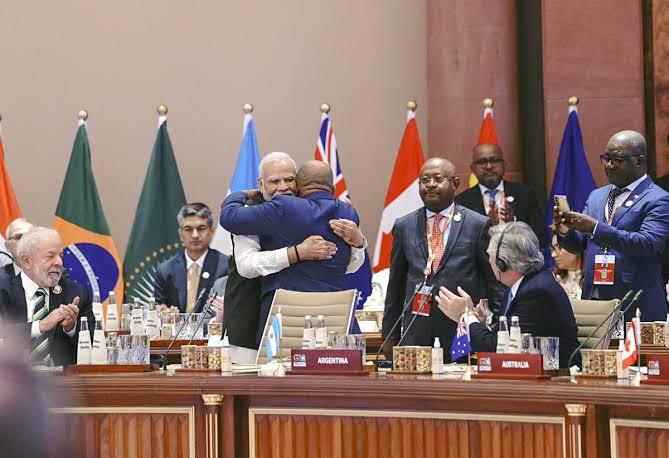The just-concluded United Nations climate change conference (COP29) saw the Africa Group of Negotiators push for an ambitious $1.3 trillion annual climate finance target by 2030, with a broader objective of $6.5 trillion overall.
With pressing global climate deadlines around the corner, the summit has already borne witness to major decisions and ambitious pledges that could shape the trajectory of global climate action for years to come.
Red Alerts
One of COP29’s landmark achievements was the operationalisation of the Loss and Damage Fund. Designed to address the financial burden of climate-induced disasters, the fund offers a lifeline for African nations frequently impacted by floods, droughts, and cyclones. However, concerns remain about equitable access and governance, with African leaders calling for transparency to ensure that the most vulnerable communities directly benefit.
READ ALSO: http://UNGA 2024: Africa Calls For Implementation of COP28 Policies
On the inaugural day of the conference, the UN’s World Meteorological Organization (WMO) announces a growing scientific consensus indicating that 2024 is on course to become the hottest year ever recorded in human history, overtaking 2023, which currently holds the record. WMO secretary-general Celeste Paulo remarked, “This is another SOS for the planet. The period from 2015 to 2024 will be the warmest 10 years on record.” She further stated, “The record-breaking rainfall and flooding, rapidly intensifying tropical cyclones, deadly heat, relentless drought, and raging wildfires that we have witnessed in various regions of the world this year are unfortunately our new reality and a foretaste of our future.
An agreement was reached among the participants on standards and rules for the establishment of carbon credits. This decision aligns with Article 6.4 of the Paris Agreement, which refers to “a mechanism to contribute to the mitigation of greenhouse gas emissions and support sustainable development.” Article 6 sets out a framework for a global carbon credit market, enabling the transfer of greenhouse gas emission reductions or removals between nations. This mechanism aims to promote international collaboration in achieving Nationally Determined Contributions (NDCs), which are the plans of countries to reduce emissions and adapt to a changing climate.
The “UAE Dialogue,” an essential component of the finance track, seeks to convert the outcomes of the stocktake into implementable strategies. The Africa Group of negotiators has proposed an annual climate finance target of $1.3 trillion by 2030, aiming for a total of $6.5 trillion overall. These numbers highlight the increasing disparity among negotiating factions regarding how to tackle the financial challenges associated with climate adaptation and mitigation.
A call to action
Speaking at the event “Africa’s Green Momentum: Harnessing Renewables for Industrialization” during COP29 in Baku, Guterres urged world leaders to act decisively to support Africa’s clean energy transition.
Citing the Nairobi Declaration and projects already underway on the continent as evidence of Africa’s commitment to clean energy, he highlighted the transformative power of renewable energy to drive industrialization, economic growth, and sustainable development.
“From Cairo to Cape Town, renewable energy can revolutionize lives,” he said, noting its potential to deliver affordable electricity, improve health outcomes, and lower costs for millions.
The benefits of renewables extend far beyond energy access, as they offer Africa a chance to spearhead a global clean energy revolution and secure economic prosperity for future generations, Guterres stressed.
The Secretary-General called on all countries to update their Nationally Determined Contributions (NDCs) by next year, aligning their policies with global energy transition goals and limiting temperature rise to 1.5 degrees Celsius. He underscored the role of these commitments in attracting investment to align national energy strategies with climate action and development priorities.
Guterres emphasized that the G20 nations, as the biggest emitters, must take the lead in phasing out fossil fuels. Nevertheless, he urged all countries to seize the opportunity for progress.
Overcoming financial barriers
Despite having 60% of the world’s best solar resources, Africa accounts for only 1% of installed solar capacity, with 600 million people still lacking electricity access.
Guterres called for a fundamental overhaul of the international financial system, urging developed nations to meet their climate finance commitments. He advocated for a new global financial framework that includes innovative funding mechanisms, such as levies on shipping, aviation, and fossil fuel extraction, as well as reforms to multilateral development banks to increase concessional lending.
These reforms, the Secretary-General said, are critical to bridging the investment gap and driving Africa’s clean energy Guterres also spoke about the disproportionate impact of the climate crisis on Africa, which contributes minimally to global emissions but suffers severe consequences. He called for developed nations to double adaptation financing to $40 billion annually by 2025 and to provide substantial contributions to the newly established Loss and Damage Fund.
“Africa belongs at the forefront of the renewables revolution,” Guterres said. “Together, we can harness its green momentum to power a prosperous, sustainable future.”
COP29 has underscored Africa’s dual identity in the climate crisis: a victim of global inaction and a beacon of possibility. The summit’s outcomes present an opportunity to transform vulnerabilities into leadership. As Africa moves forward, the challenge lies in converting pledges into policies, plans into projects, and global solidarity into tangible results.
The road ahead demands that African leaders, international partners, and local communities work in harmony to shape a green future, ensuring that the continent not only adapts to climate change but thrives in its aftermath.


